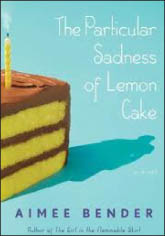
By Alyssa Gillon
Correspondent
In a surreal and imaginative twist of the typical coming-of-age story, Aimee Bender follows needy Rose Eldstein as she struggles with her ability to taste the often disturbing or deeply repressed emotions of whoever prepares her food in “The Particular Sadness of Lemon Cake.”
Her mother’s lemon cake tastes of despair, her brother’s toast is unbearably putrid and perhaps worst of all, the food she prepares herself tastes like an empty factory. Exciting concepts, but what does it all mean?
Readers hoping that easy reading equals easy comprehension will be disappointed, as the novel doesn’t unfurl without decent prodding on the reader’s part.
Though others’ feelings are easily accessible to her, Rose is restrained from fully utilizing her gift by the individual’s preference to be separate. While Rose’s gift could be used to promote emotional understanding, her ability is wasted, as her knowledge does not allow her to close the gap that essentially separates us all.
Although the novel’s hanging plot threads can be frustrating and left many critics feeling short-changed, the emotional cohesion of the novel did most of the heavy lifting and completed the piece, despite its unanswered questions.






